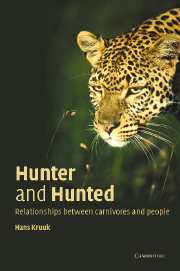Book contents
- Frontmatter
- Contents
- Preface
- 1 Turning the other cheek
- 2 Carnivore society: hermits and communes
- 3 The quarry of the hunter
- 4 Man the hunted
- 5 Competitors and carriers
- 6 History of a conflict
- 7 What is the use?
- 8 Wolves with human souls: pets
- 9 Carnivores and neighbours: effects on prey
- 10 Crying wolf: anti-predator behaviour
- 11 Carnivores in culture
- 12 The future
- Epilogue
- References
- Index
5 - Competitors and carriers
Predation on game and livestock
Published online by Cambridge University Press: 08 January 2010
- Frontmatter
- Contents
- Preface
- 1 Turning the other cheek
- 2 Carnivore society: hermits and communes
- 3 The quarry of the hunter
- 4 Man the hunted
- 5 Competitors and carriers
- 6 History of a conflict
- 7 What is the use?
- 8 Wolves with human souls: pets
- 9 Carnivores and neighbours: effects on prey
- 10 Crying wolf: anti-predator behaviour
- 11 Carnivores in culture
- 12 The future
- Epilogue
- References
- Index
Summary
Conservationists will often deny that carnivores do damage to our interests. However, if friends are accused of committing some misdemeanour, it is obviously good policy to find out exactly what the crime was, before jumping to their defence. I am taking the same line on carnivores, and in this chapter I will detail more of their alleged wrongdoing. By doing this I am not taking an anti-carnivore stance, but I want to tally the counts against them, before putting it all in perspective in the following chapters.
Recently I was following the blood-stained track of an otter that had dragged one of my ducks through the snow and out of my garden in Scotland. I happened to be pleased about that event, because I thought it was very exciting to have an otter on my own doorstep, but not everybody would have been. On that occasion I was just one of the latest losers in a long, unending battle between carnivores and us. Before me, people have lost their livestock to the sharp-toothed forces of nature since time immemorial. Wild predators have cheated us out of our dues from hunting and farming ever since we took up the cudgel and chased our quarry in the wilds. Carnivores have been bothering our species in many ways, quite apart from eating us.
In this chapter I will discuss some of the evidence for damage to man's interests by carnivores, including damage to game, livestock and other resources, or to our health.
- Type
- Chapter
- Information
- Hunter and HuntedRelationships between Carnivores and People, pp. 79 - 102Publisher: Cambridge University PressPrint publication year: 2002



